- Home
- Samuel Beckett
First Love and Other Shorts
First Love and Other Shorts Read online
Works by Samuel Beckett published by Grove Press
COLLECTED POEMS IN ENGLISH AND FRENCH
COLLECTED SHORTER PLAYS
(All That Fall, Act Without Words I, Act Without Words II, Krapp's Last Tape, Rough for Theatre I, Rough For Theatre II, Embers, Rough for Radio I, Rough for Radio II, Words and Music, Cascando, Play, Film, The Old Tune, Come and Go, Eh Joe, Breath, Not I, That Time, Footfalls, Ghost Trio, … but the clouds …, A Piece of Monologue, Rockaby, Ohio Impromptu, Quad, Catastrophe, Nacht and Träume, What Where)
COMPLETE SHORT PROSE: 1929–1989
(Assumption, Sedendo et Quiescendo, Text, A Case in a Thousand, First Love, The Expelled, The Calmative, The End, Texts for Nothing 1–13, From an Abandoned Work, The Image, All Strange Away, Imagination Dead Imagine, Enough, Ping, Lessness, The Lost Ones, Fizzles 1–8, Heard in the Dark 1, Heard in the Dark 2, One Evening, As the story was told, The Cliff, neither, Stirrings Still, Variations on a “Still” Point, Faux Départs, The Capital of the Ruins)
DISJECTA:
Miscellaneous Writings and a Dramatic Fragment
ENDGAME AND ACT WITHOUT WORDS
HAPPY DAYS
HOW IT IS
I CAN'T GO ON, I'LL GO ON:
A Samuel Beckett Reader
KRAPP'S LAST TAPE (All That Fall, Embers, Act Without Words I, Act Without Words II)
MERCIER AND CAMIER
MOLLOY
MORE PRICKS THAN KICKS
(Dante and the Lobster, Fingal, Ding-Dong, A Wet Night, Love and Lethe, Walking Out, What a Misfortune, The Smeraldina's Billet Doux, Yellow, Draff)
MURPHY
NOHOW ON (Company, III Seen III Said, Worstward Ho)
PROUST
STORIES AND TEXTS FOR NOTHING
(The Expelled, The Calmative, The End, Texts for Nothing 1–13)
THREE NOVELS (Molloy, Malone Dies, The Unnamable)
WAITING FOR GODOT
WATT
HAPPY DAYS:
Production Notebooks
WAITING FOR GODOT:
Theatrical Notebooks
Copyright © 1957, 1965, 1966, 1969, 1970, 1973, 1974 by Samuel Beckett
Copyright © this collection 1974 by Grove Press, Inc.
All rights reserved. No part of this book may be reproduced in any form or by any electronic or mechanical means, including information storage and retrieval systems, without permission in writing from the publisher, except by a reviewer, who may quote brief passages in a review. Any members of educational institutions wishing to photocopy part or all of the work for classroom use, or publishers who would like to obtain permission to include the work in an anthology, should send their inquiries to Grove/Atlantic, Inc., 841 Broadway, New York, NY 10003.
Published simultaneously in Canada
Printed in the United States of America
First Love* originally published by Editions de Minuit, Paris, as Premier Amour, 1970. First published in U.S. in this edition by Grove Press, Inc., 1974
From an Abandoned Work first published in Evergreen Review, New York, 1957.
Enough* originally published by Editions de Minuit, Paris, as Assez, 1966. First published in U.S. in this edition by Grove Press, Inc., 1974
Imagination Dead Imagine* originally published by Editions de Minuit, Paris, as Imagination Morte Imaginez, 1965. First published in U.S. in Evergreen Review, New York, 1966
Ping* originally published by Editions de Minuit, Paris, as Bing, 1966. First published in U.S. in this edition by Grove Press, Inc., 1974
Not I first published in English by Faber and Faber Limited, London, 1973. First published in U.S. in this edition by Grove Press, Inc., 1974
Breath first published by Grove Press, Inc., 1969
*Translations from the original French text by the author. All others originally written in English.
Library of Congress Catalog Number 73–15463
ISBN 9780802198327
Grove Press
841 Broadway
New York, NY 10003
02 03 04 05 10 9 8 7 6 5 4
First Love
From an Abandoned Work
Enough
Imagination Dead Imagine
Ping
Not I
Breath
First Love
I associate, rightly or wrongly, my marriage with the death of my father, in time. That other links exist, on other planes, between these two affairs, is not impossible. I have enough trouble as it is in trying to say what I think I know.
I visited, not so long ago, my father's grave, that I do know, and noted the date of his death, of his death alone, for that of his birth had no interest for me, on that particular day. I set out in the morning and was back by night, having lunched lightly in the graveyard. But some days later, wishing to know his age at death, I had to return to the grave, to note the date of his birth. These two limiting dates I then jotted down on a piece of paper, which I now carry about with me. I am thus in a position to affirm that I must have been about twenty-five at the time of my marriage. For the date of my own birth, I repeat, my own birth, I have never forgotten, I never had to note it down, it remains graven in my memory, the year at least, in figures that life will not easily erase. The day itself comes back to me, when I put my mind to it, and I often celebrate it, after my fashion, I don't say each time it comes back, for it comes back too often, but often.
Personally I have nothing against graveyards, I take the air there willingly, perhaps more willingly than elsewhere, when take the air I must. The smell of corpses, distinctly perceptible under those of grass and humus mingled, I do not find unpleasant, a trifle on the sweet side perhaps, a trifle heady, but how infinitely preferable to what the living emit, their feet, teeth, armpits, arses, sticky foreskins and frustrated ovules. And when my father's remains join in, however modestly, I can almost shed a tear. The living wash in vain, in vain perfume themselves, they stink. Yes, as a place for an outing, when out I must, leave me my grave-yards and keep—you—to your public parks and beauty-spots. My sandwich, my banana, taste sweeter when I'm sitting on a tomb, and when the time comes to piss again, as it so often does, I have my pick. Or I wander, hands clasped behind my back, among the slabs, the flat, the leaning and the upright, culling the inscriptions. Of these I never weary, there are always three or four of such drollery that I have to hold on to the cross, or the stele, or the angel, so as not to fall. Mine I composed long since and am still pleased with it, tolerably pleased. My other writings are no sooner dry than they revolt me, but my epitaph still meets with my approval. There is little chance unfortunately of its ever being reared above the skull that conceived it, unless the State takes up the matter. But to be unearthed I must first be found, and I greatly fear those gentlemen will have as much trouble finding me dead as alive. So I hasten to record it here and now, while there is yet time:
Hereunder lies the above who up below
So hourly died that he survived till now.
The second and last or rather latter line limps a little perhaps, but that is no great matter, I'll be forgiven more than that when I'm forgotten. Then with a little luck you hit on a genuine interment, with real live mourners and the odd relict rearing to throw herself into the pit. And nearly always that charming business with the dust, though in my experience there is nothing less dusty than holes of this type, verging on muck for the most part, nor anything particularly powdery about the deceased, unless he happen to have died, or she, by fire. No matter, their little gimmick with the dust is charming. But my father's yard was not among my favourite. To begin with it was too remote, way out in the wilds of the country on the side of a hill, and too small, far too small, to go on with. Indeed it was almost
full, a few more widows and they'd be turning them away. I infinitely preferred Ohlsdorf, particularly the Linne section, on Prussian soil, with its nine hundred acres of corpses packed tight, though I knew no one there, except by reputation the wild animal collector Hagenbeck. A lion, if I remember right, is carved on his monument, death must have had for Hagenbeck the countenance of a lion. Coaches ply to and fro, crammed with widows, widowers, orphans and the like. Groves, rottoes, artificial lakes with swans, purvey consolation to the inconsolable. It was December, I had never felt so cold, the eel soup lay heavy on my stomach, I was afraid I'd die, I turned aside to vomit, I envied them.
But to pass on to less melancholy matters, on my father's death I had to leave the house. It was he who wanted me in the house. He was a strange man. One day he said, Leave him alone, he's not disturbing anyone. He didn't know I was listening. This was a view he must have often voiced, but the other times I wasn't by. They would never let me see his will, they simply said he had left me such a sum. I believed then, and still believe, that he had stipulated in his will for me to be left the room I had occupied in his lifetime and for food to be brought me there, as hitherto. He may even have given this the force of condition precedent. Presumably he liked to feel me under his roof, otherwise he would not have opposed my eviction. Perhaps he merely pitied me. But somehow I think not. He should have left me the entire house, then I'd have been all right, the others too for that matter, I'd have summoned them and said, Stay, stay by all means, your home is here. Yes, he was properly had, my poor father, if his purpose was really to go on protecting me from beyond the tomb. With regard to the money it is only fair to say they gave it to me without delay, on the very day following the inhumation. Perhaps they were legally bound to. I said to them, Keep this money and let me live on here, in my room, as in Papa's lifetime. I added, God rest his soul, in the hope of melting them. But they refused. I offered to place myself at their disposal, a few hours every day, for the little odd maintenance jobs every dwelling requires, if it is not to crumble away. Pottering is still just possible, I don't know why. I proposed in particular to look after the hothouse. There I would have gladly whiled away the hours, in the heat, tending the tomatoes, hyacinths, pinks and seedlings. My father and I alone, in that household, understood tomatoes. But they refused. One day, on my return from stool, I found my room locked and my belongings in a heap before the door. This will give you some idea how constipated I was, at this juncture. It was, I am now convinced, anxiety constipation. But was I genuinely constipated? Somehow I think not. Softly, softly. And yet I must have been, for how otherwise account for those long, those cruel sessions in the necessary house? At such times I never read, any more than at other times, never gave way to revery or meditation, just gazed dully at the almanac hanging from a nail before my eyes, with its chromo of a bearded stripling in the midst of sheep, Jesus no doubt, parted the cheeks with both hands and strained, heave! ho! heave! ho!, with the motions of one tugging at the oar, and only one thought in my mind, to be back in my room and flat on my back again. What can that have been but constipation? Or am I confusing it with the diarrhoea? It's all a muddle in my head, graves and nuptials and the different varieties of motion. Of my scanty belongings they had made a little heap, on the floor, against the door. I can still see that little heap, in the kind of recess full of shadow between the landing and my room. It was in this narrow space, guarded on three sides only, that I had to change, I mean exchange my dressing-gown and nightgown for my travelling costume, I mean shoes, socks, trousers, shirt, coat, greatcoat and hat, I can think of nothing else. I tried other doors, turning the knobs and pushing, or pulling, before I left the house, but none yielded. I think if I'd found one open I'd have barricaded myself in the room, they would have had to gas me out. I felt the house crammed as usual, the usual pack, but saw no one. I imagined them in their various rooms, all bolts drawn, every sense on the alert. Then the rush to the window, each holding back a little, hidden by the curtain, at the sound of the street door closing behind me, I should have left it open. Then the doors fly open and out they pour, men, women and children, and the voices, the sighs, the smiles, the hands, the keys in the hands, the blessed relief, the precautions rehearsed, if this then that, but if that then this, all clear and joy in every heart, come let's eat, the fumigation can wait. All imagination to be sure, I was already on my way, things may have passed quite differently, but who cares how things pass, provided they pass. All those lips that had kissed me, those hearts that had loved me (it is with the heart one loves, is it not, or am I confusing it with something else?), those hands that had played with mine and those minds that had almost made their own of me! Humans are truly strange. Poor Papa, a nice mug he must have felt that day if he could see me, see us, a nice mug on my account I mean. Unless in his great disembodied wisdom he saw further than his son whose corpse was not yet quite up to scratch.
But to pass on to less melancholy matters, the name of the woman with whom I was soon to be united was Lulu. So at least she assured me and I can't see what interest she could have had in lying to me, on this score. Of course one can never tell. She also disclosed her family name, but I've forgotten it. I should have made a note of it, on a piece of paper, I hate forgetting a proper name. I met her on a bench, on the bank of the canal, one of the canals, for our town boasts two, though I never knew which was which. It was a well situated bench, backed by a mound of solid earth and garbage, so that my rear was covered. My flanks too, partially, thanks to a pair of venerable trees, more than venerable, dead, at either end of the bench. It was no doubt these trees one fine day, aripple with all their foliage, that had sown the idea of a bench, in someone's fancy. To the fore, a few yards away, flowed the canal, if canals flow, don't ask me, so that from that quarter too the risk of surprise was small. And yet she surprised me. I lay stretched out, the night being warm, gazing up through the bare boughs interlocking high above me, where the trees clung together for support, and through the drifting cloud, at a patch of starry sky as it came and went. Shove up, she said. My first movement was to go, but my fatigue, and my having nowhere to go, dissuaded me from acting on it. So I drew back my feet a little way and she sat. Nothing more passed between us that evening and she soon took herself off, without another word. All she had done was sing, sotto voce, as to herself, and without the words fortunately, some old folk songs, and so disjointedly, skipping from one to another and finishing none, that even I found it strange. The voice, though out of tune, was not unpleasant. It breathed of a soul too soon wearied ever to conclude, that perhaps least arse-aching soul of all. The bench itself was soon more than she could bear and as for me, one look had been enough for her. Whereas in reality she was a most tenacious woman. She came back next day and the day after and all went off more or less as before. Perhaps a few words were exchanged. The next day it was raining and I felt in security. Wrong again. I asked her if she was resolved to disturb me every evening. I disturb you? she said. I felt her eyes on me. They can't have seen much, two eyelids at the most, with a hint of nose and brow, darkly, because of the dark. I thought we were easy, she said. You disturb me, I said, I can't stretch out with you there. The collar of my greatcoat was over my mouth and yet she heard me. Must you stretch out? she said. The mistake one makes is to speak to people. You have only to put your feet on my knees, she said. I didn't wait to be asked twice, under my miserable calves I felt her fat thighs. She began stroking my ankles. I considered kicking her in the cunt. You speak to people about stretching out and they immediately see a body at full length. What mattered to me in my dispeopled kingdom, that in regard to which the disposition of my carcass was the merest and most futile of accidents, was supineness in the mind, the dulling of the self and of that residue of exercrable frippery known as the non-self and even the world, for short. But man is still today, at the age of twenty-five, at the mercy of an erection, physically too, from time to time, it's the common lot, even I was not immune, if that may be called an ere
ction. It did not escape her naturally, women smell a rigid phallus ten miles away and wonder, How on earth did he spot me from there? One is no longer oneself, on such occasions, and it is painful to be no longer oneself, even more painful if possible than when one is. For when one is one knows what to do to be less so, whereas when one is not one is any old one irredeemably. What goes by the name of love is banishment, with now and then a postcard from the homeland, such is my considered opinion, this evening. When she had finished and my self been resumed, mine own, the mitigable, with the help of a brief torpor, it was alone. I sometimes wonder if that is not all invention, if in reality things did not take quite a different course, one I had no choice but to forget. And yet her image remains bound, for me, to that of the bench, not the bench by day, nor yet the bench by night, but the bench at evening, in such sort that to speak of the bench, as it appeared to me at evening, is to speak of her, for me. That proves nothing, but there is nothing I wish to prove. On the subject of the bench by day no words need be wasted, it never knew me, gone before morning and never back till dusk. Yes, in the daytime I foraged for food and marked down likely cover. Were you to inquire, as undoubtedly you itch, what I had done with the money my father had left me, the answer would be I had done nothing with it but leave it lie in my pocket. For I knew I would not be always young, and that summer does not last for ever either, nor even autumn, my mean soul told me so. In the end I told her I'd had enough. She disturbed me exceedingly, even absent. Indeed she still disturbs me, but no worse now than the rest. And it matters nothing to me now, to be disturbed, or so little, what does it mean, disturbed, and what would I do with myself if I wasn't? Yes, I've changed my system, it's the winning one at last, for the ninth or tenth time, not to mention not long now, not long till curtain down, on disturbers and disturbed, no more tattle about that, all that, her and the others, the shitball and heaven's high halls. So you don't want me to come any more, she said. It's incredible the way they repeat what you've just said to them, as if they risked faggot and fire in believing their ears. I told her to come just the odd time. I didn't understand women at that period. I still don't for that matter. Nor men either. Nor animals either. What I understand best, which is not saying much, are my pains. I think them through daily, it doesn't take long, thought moves so fast, but they are not only in my thought, not all. Yes, there are moments, particularly in the afternoon, when I go all syncretist, à la Reinhold. What equilibrium! But even them, my pains, I understand ill. That must come from my not being all pain and nothing else. There's the rub. Then they recede, or I, till they fill me with amaze and wonder, seen from a better planet. Not often, but I ask no more. Catch-cony life! To be nothing but pain, how that would simplify matters! Omnidolent! Impious dream. I'll tell them to you some day none the less, if I think of it, if I can, my strange pains, in detail, distinguishing between the different kinds, for the sake of clarity, those of the mind, those of the heart or emotional conative, those of the soul (none prettier than these) and finally those of the frame proper, first the inner or latent, then those affecting the surface, beginning with the hair and scalp and moving methodically down, without haste, all the way down to the feet beloved of the corn, the cramp, the kibe, the bunion, the hammer toe, the nail ingrown, the fallen arch, the common blain, the club foot, duck foot, goose foot, pigeon foot, flat foot, trench foot and other curiosities. And I'll tell by the same token, for those kind enough to listen, in accordance with a system whose inventor I forget, of those instants when, neither drugged, nor drunk, nor in ecstasy, one feels nothing. Next of course she desired to know what I meant by the odd time, that's what you get for opening your mouth. Once a week? Once in ten days? Once a fortnight? I replied less often, far less often, less often to the point of no more if she could, and if she could not the least often possible. And the next day (what is more) I abandoned the bench, less I must confess on her account than on its, for the site no longer answered my requirements, modest though they were, now that the air was beginning to strike chill, and for other reasons better not wasted on cunts like you, and took refuge in a deserted cowshed marked on one of my forays. It stood in the corner of a field richer on the surface in nettles than in grass and in mud than in nettles, but whose sub-soil was perhaps possessed of exceptional qualities. It was in this byre, littered with dry and hollow cowclaps subsiding with a sigh at the poke of my finger, that for the first time in my life, and I would not hesitate to say the last if I had not to husband my cyanide, I had to contend with a feeling which gradually assumed, to my dismay, the dread name of love. What constitutes the charm of our country, apart of course from its scant population, and this without help of the meanest contraceptive, is that all is derelict, with the sole exception of history's ancient faeces. These are ardently sought after, stuffed and carried in procession. Wherever nauseated time has dropped a nice fat turd you will find our patriots, sniffing it up on all fours, their faces on fire. Elysium of the roofless. Hence my happiness at last. Lie down, all seems to say, lie down and stay down. I see no connexion between these remarks. But that one exists, and even more than one, I have little doubt, for my part. But what? Which? Yes, I loved her, it's the name I gave, still give alas, to what I was doing then. I had nothing to go by, having never loved before, but of course had heard of the thing, at home, in school, in brothel and at church, and read romances, in prose and verse, under the guidance of my tutor, in six or seven languages, both dead and living, in which it was handled at length. I was therefore in a position, in spite of all, to put a label on what I was about when I found myself inscribing the letters of Lulu in an old heifer pat or flat on my face in the mud under the moon trying to tear up the nettles by the roots. They were giant nettles, some full three foot high, to tear them up assuaged my pain, and yet it's not like me to do that to weeds, on the contrary, I'd smother them in manure if I had any. Flowers are a different matter. Love brings out the worst in man and no error. But what kind of love was this, exactly? Love-passion? Somehow I think not. That's the priapic one, is it not? Or is this a different variety? There are so many, are there not? All equally if not more delicious, are they not? Platonic love, for example, there's another just occurs to me. It's disinterested. Perhaps I loved her with a platonic love? But somehow I think not. Would I have been tracing her name in old cow-shit if my love had been pure and disinterested? And with my devil's finger into the bargain, which I then sucked. Come now! My thoughts were all of Lulu, if that doesn't give you some idea nothing will. Anyhow I'm sick and tired of this name Lulu, I'll give her another, more like her, Anna for example, it's not more like her but no matter. I thought of Anna then, I who had learnt to think of nothing, nothing except my pains, a quick think through, and of what steps to take not to perish off-hand of hunger, or cold, or shame, but never on any account of living beings as such (I wonder what that means) whatever I may have said, or may still say, to the contrary or otherwise, on this subject. But I have always spoken, no doubt always shall, of things that never existed, or that existed if you insist, no doubt always will, but not with the existence I ascribe to them. Kepis, for example, exist beyond a doubt, indeed there is little hope of their ever disappearing, but personally I never wore a kepi. I wrote somewhere, They gave me … a hat. Now the truth is they never gave me a hat, I have always had my own hat, the one my father gave me, and I have never had any other hat than that hat. I may add it has followed me to the grave. I thought of Anna then, long long sessions, twenty minutes, twenty-five minutes and even as long as half an hour daily. I obtain these figures by the addition of other, lesser figures. That must have been my way of loving. Are we to infer from this I loved her with that intellectual love which drew from me such drivel, in another place? Somehow I think not. For had my love been of this kind would I have stooped to inscribe the letters of Anna in time's forgotten cowplats? To divellicate urtica plenis manibus? And felt, under my tossing head, her thighs to bounce like so many demon bolsters? Come now! In order to put an end, to try and pu
t an end, to this plight, I returned one evening to the bench, at the hour she had used to join me there. There was no sign of her and I waited in vain. It was December already, if not January, and the cold was seasonable, that is to say reasonable, like all that is seasonable. But one is the hour of the dial, and another that of changing air and sky, and another yet again the heart's. To this thought, once back in the straw, I owed an excellent night. The next day I was earlier to the bench, much earlier, night having barely fallen, winter night, and yet too late, for she was there already, on the bench, under the boughs tinkling with rime, her back to the frosted mound, facing the icy water. I told you she was a highly tenacious woman. I felt nothing. What interest could she have in pursuing me thus? I asked her, without sitting down, stumping to and fro. The cold had embossed the path. She replied she didn't know. What could she see in me, would she kindly tell me that at least, if she could. She replied she couldn't. She seemed warmly clad, her hands buried in a muff. As I looked at this muff, I remember, tears came to my eyes. And yet I forget what colour it was. The state I was in then! I have always wept freely, without the least benefit to myself, till recently. If I had to weep this minute I could squeeze till I was blue, I'm convinced not a drop would fall. The state I am in now! It was things made me weep. And yet I felt no sorrow. When I found myself in tears for no apparent reason it meant I had caught sight of something unbeknownst. So I wonder if it was really the muff that evening, if it was not rather the path, so iron hard and bossy as perhaps to feel like cobbles to my tread, or some other thing, some chance thing glimpsed below the threshold, that so unmanned me. As for her, I might as well never have laid eyes on her before. She sat all huddled and muffled up, her head sunk, the muff with her hands in her lap, her legs pressed tight together, her heels clear of the ground. Shapeless, ageless, almost lifeless, it might have been anything or anyone, an old woman or a little girl. And the way she kept on saying, I don't know, I can't. I alone did not know and could not. Is it on my account you came? I said. She managed yes to that. Well here I am, I said. And I? Had I not come on hers? Here we are, I said. I sat down beside her but sprang up again immediately as though scalded. I longed to be gone, to know if it was over. But before going, to be on the safe side, I asked her to sing me a song. I thought at first she was going to refuse, I mean simply not sing, but no, after a moment she began to sing and sang for some time, all the time the same song it seemed to me, without change of attitude. I did not know the song, I had never heard it before and shall never hear it again. It had something to do with lemon trees, or orange trees, I forget, that is all I remember, and for me that is no mean feat, to remember it had something to do with lemon trees, or orange trees, I forget, for of all the other songs I have ever heard in my life, and I have heard plenty, it being apparently impossible, physically impossible short of being deaf, to get through this world, even my way, without hearing singing, I have retained nothing, not a word, not a note, or so few words, so few notes, that, that what, that nothing, this sentence has gone on long enough. Then I started to go and as I went I heard her singing another song, or perhaps more verses of the same, fainter and fainter the further I went, then no more, either because she had come to an end or because I was gone too far to hear her. To have to harbour such a doubt was something I preferred to avoid, at that period. I lived of course in doubt, on doubt, but such trivial doubts as this, purely somatic as some say, were best cleared up without delay, they could nag at me like gnats for weeks on end. So I retraced my steps a little way and stopped. At first I heard nothing, then the voice again, but only just, so faintly did it carry. First I didn't hear it, then I did, I must therefore have begun hearing it, at a certain point, but no, there was no beginning, the sound emerged so softly from the silence and so resembled it. When the voice ceased at last I approached a little nearer, to make sure it had really ceased and not merely been lowered. Then in despair, saying, No knowing, no knowing, short of being beside her, bent over her, I turned on my heel and went, for good, full of doubt. But some weeks later, even more dead than alive than usual, I returned to the bench, for the fourth or fifth time since I had abandoned it, at roughly the same hour, I mean roughly the same sky, no, I don't mean that either, for it's always the same sky and never the same sky, what words are there for that, none I know, period. She wasn't there, then suddenly she was, I don't know how, I didn't see her come, nor hear her, all ears and eyes though I was. Let us say it was raining, nothing like a change, if only of weather. She had her umbrella up, naturally, what an outfit. I asked if she came every evening. No, she said, just the odd time. The bench was soaking wet, we paced up and down, not daring to sit. I took her arm, out of curiosity, to see if it would give me pleasure, it gave me none, I let it go. But why these particulars? To put off the evil hour. I saw her face a little clearer, it seemed normal to me, a face like millions of others. The eyes were crooked, but I didn't know that till later. It looked neither young nor old, the face, as though stranded between the vernal and the sere. Such ambiguity I found difficult to bear, at that period. As to whether it was beautiful, the face, or had once been beautiful, or could conceivably become beautiful, I confess I could form no opinion. I had seen faces in photographs I might have found beautiful had I known even vaguely in what beauty was supposed to consist. And my father's face, on his death-bolster, had seemed to hint at some form of aesthetics relevant to man. But the faces of the living, all grimace and flush, can they be described as objects? I admired in spite of the dark, in spite of my fluster, the way still or scarcely flowing water reaches up, as though athirst, to that falling from the sky. She asked if I would like her to sing something. I replied no, I would like her to say something. I thought she would say she had nothing to say, it would have been like her, and so was agreeably surprised when she said she had a room, most agreeably surprised, though I suspected as much. Who has not a room? Ah I hear the clamour. I have two rooms, she said. Just how many rooms do you have? I said. She said she had two rooms and a kitchen. The premises were expanding steadily, given time she would remember a bathroom. Is it two rooms I heard you say? I said. Yes, she said. Adjacent? I said. At last conversation worthy of the name. Separated by the kitchen, she said. I asked her why she had not told me before. I must have been beside myself, at this period. I did not feel easy when I was with her, but at least free to think of something else than her, of the old trusty things, and so little by little, as down steps towards a deep, of nothing. And I knew that away from her I would forfeit this freedom.

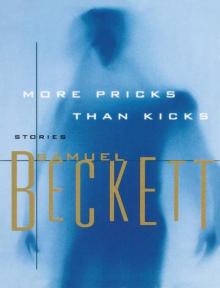 More Pricks Than Kicks
More Pricks Than Kicks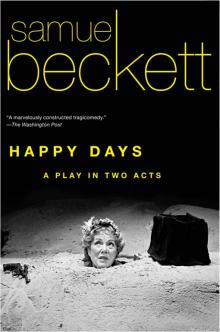 Happy Days
Happy Days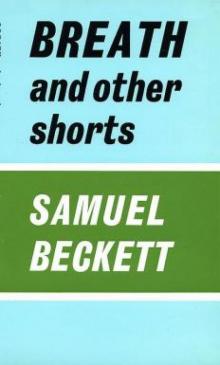 Breath, and Other Shorts
Breath, and Other Shorts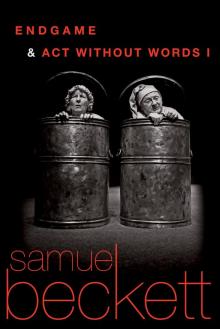 Endgame & Act Without Words
Endgame & Act Without Words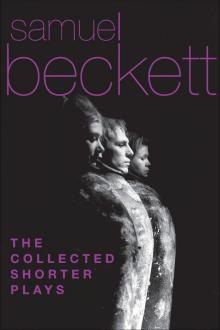 The Collected Shorter Plays of Samuel Beckett
The Collected Shorter Plays of Samuel Beckett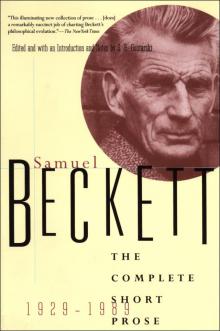 The Complete Short Prose, 1929-1989
The Complete Short Prose, 1929-1989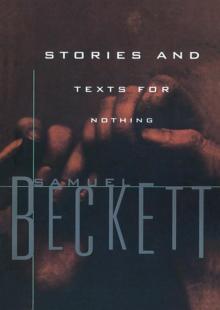 Stories and Texts for Nothing
Stories and Texts for Nothing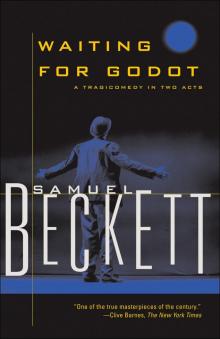 Waiting for Godot
Waiting for Godot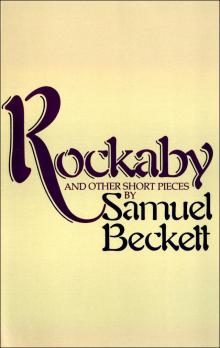 Rockaby and Other Short Pieces
Rockaby and Other Short Pieces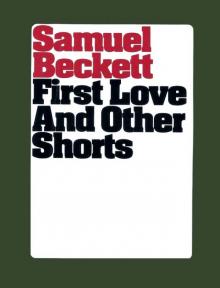 First Love and Other Shorts
First Love and Other Shorts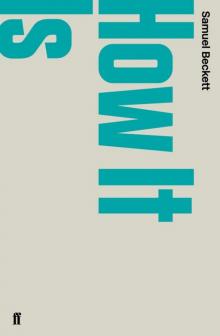 How It Is
How It Is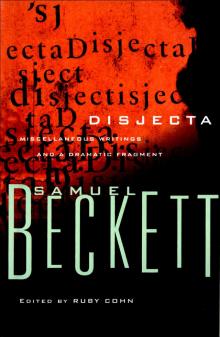 Disjecta: Miscellaneous Writings and a Dramatic Fragment
Disjecta: Miscellaneous Writings and a Dramatic Fragment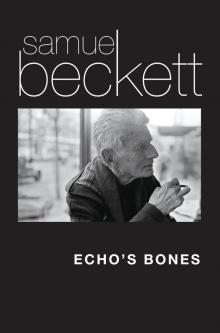 Echo's Bones
Echo's Bones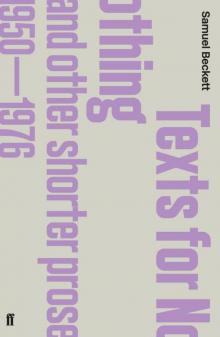 Texts for Nothing and Other Shorter Prose 1950-1976
Texts for Nothing and Other Shorter Prose 1950-1976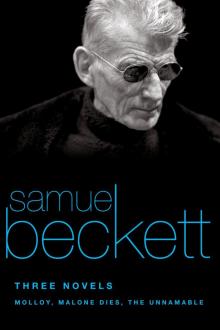 Three Novels
Three Novels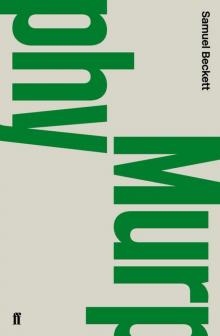 Murphy
Murphy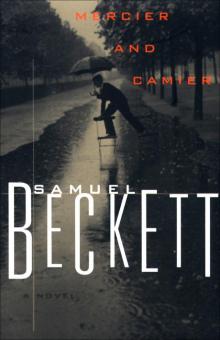 Mercier and Camier
Mercier and Camier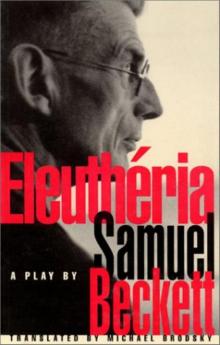 Eleuthéria
Eleuthéria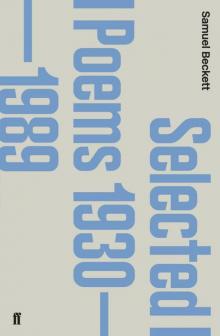 Selected Poems 1930-1988
Selected Poems 1930-1988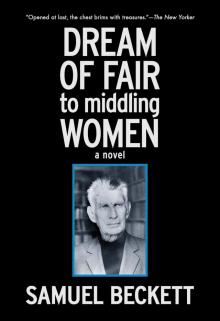 Dream of Fair to Middling Women
Dream of Fair to Middling Women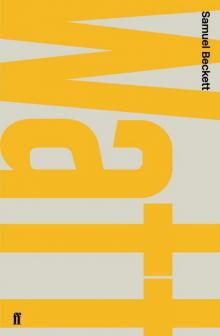 Watt
Watt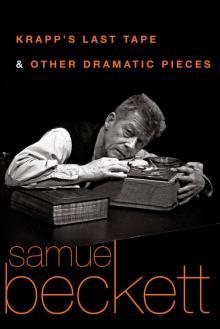 Krapp's Last Tape and Other Dramatic Pieces
Krapp's Last Tape and Other Dramatic Pieces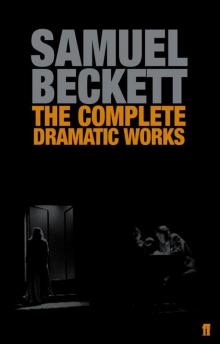 The Complete Dramatic Works of Samuel Beckett
The Complete Dramatic Works of Samuel Beckett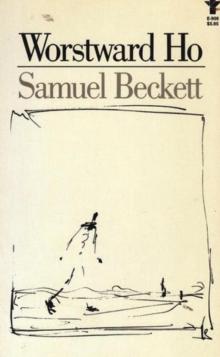 Worstward Ho
Worstward Ho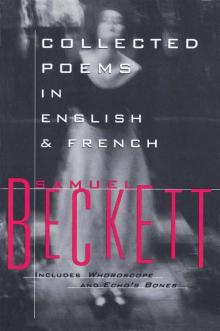 Collected Poems in English and French
Collected Poems in English and French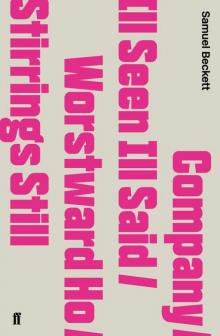 Company / Ill Seen Ill Said / Worstward Ho / Stirrings Still
Company / Ill Seen Ill Said / Worstward Ho / Stirrings Still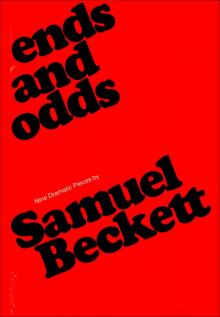 Ends and Odds
Ends and Odds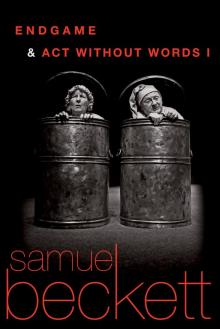 Endgame Act Without Words I
Endgame Act Without Words I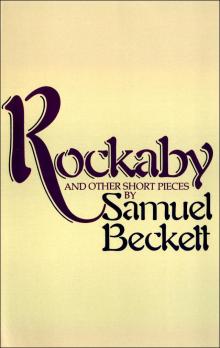 Rockabye and Other Short Pieces
Rockabye and Other Short Pieces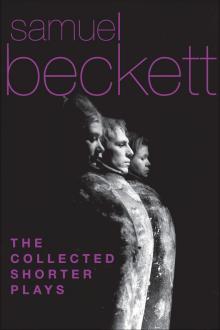 The Collected Shorter Plays
The Collected Shorter Plays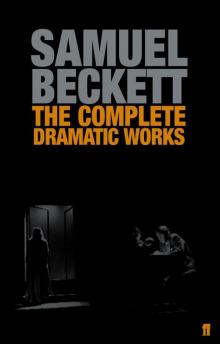 The Complete Dramatic Works
The Complete Dramatic Works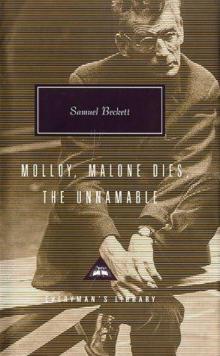 Three Novels: Malloy, Malone Dies, The Unnamable
Three Novels: Malloy, Malone Dies, The Unnamable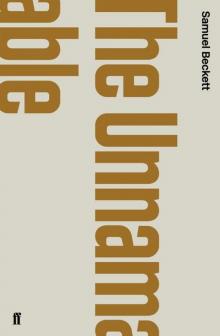 The Unnamable
The Unnamable